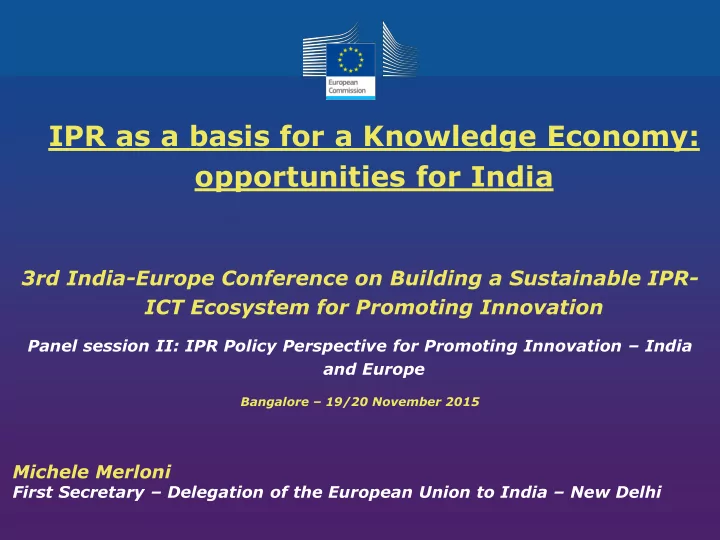

IPR as a basis for a Knowledge Economy: opportunities for India 3rd India-Europe Conference on Building a Sustainable IPR- ICT Ecosystem for Promoting Innovation Panel session II: IPR Policy Perspective for Promoting Innovation – India and Europe Bangalore – 19/20 November 2015 Michele Merloni First Secretary – Delegation of the European Union to India – New Delhi
Index 1. IPR and Innovation 2. India's innovation performance 3. India's performance in patenting 4. India's Innovation and IPR strategy 5. India and EU: dialogue on IPR
1. IPR and Innovation IPR close link with innovation growth and employment: • • Key role of emerging markets 2013 study of OHIM and EPO* on economic relevance of IP • rights intensive industries: • 1/3 of EU employment • 39% of GDP, i.e. € 4.7 trillion • More than 85% of EU trade with the rest of the world *https://oami.europa.eu/ohimportal/en/web/observatory/ip-contribution
2. India's innovation performance India should and could do better… • • 81 st in 2015 Global Innovation Index Report by WIPO. It was 23 rd in 2007. • China is 29 th and Brazil 61 st . Investment in research and development: • • China: 2% of GDP in 2014 • India: 0.8% of GDP in 2014
3. India's performance in patenting Again, India has room for improvement • • 43,674 patent applications in 2012/13, while China had 658,777 in 2012… • Only 20% of applications at the IPO are of Indian origin, while in China 60% are of Chinese origin • At the EPO, 1,361 patent filings are from India, and 22,292 from China (2012)
4. India's innovation and IPR strategy The necessity of an effective IPR regime and the link • between IPR and innovation and growth is clear: • 2013 Science, Technology and Innovation Policy • Revision of IPR Policy • Government's flagship programs: Make in India… Positive examples from the energy sector… •
5. India and EU: dialogue on IPR Different opinions on certain topics but several opportunities • for cooperation: • EPO-IPO cooperation • OHIM project in the framework of the CITD (Capacity Building Initiative for Trade Development) which runs from February 2015 to September 2017 But… necessity of a more structured dialogue, like the EU has • with many key trade partners, to exchange experiences and develop technical cooperation.
Recommend
More recommend